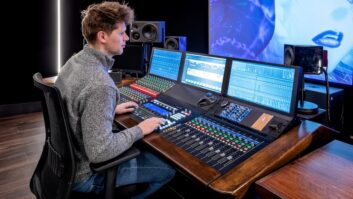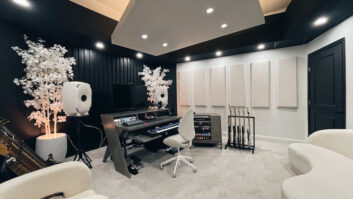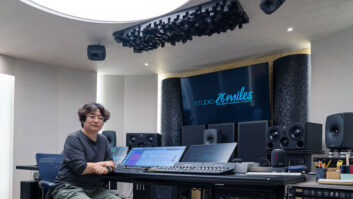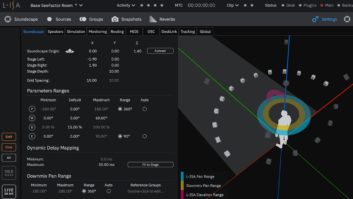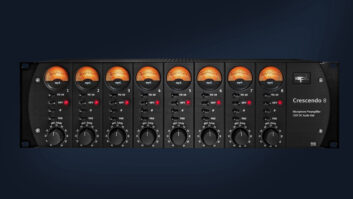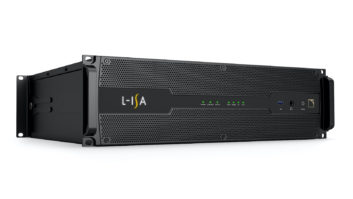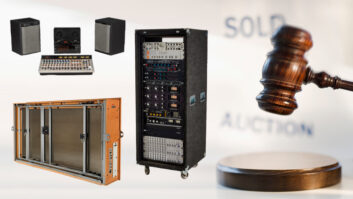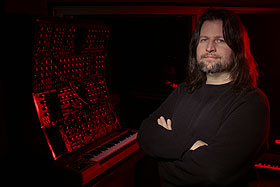
Ronan Murphy
Photo: Roscoe Webber
You’re right in the heart of a mix one afternoon when, out of the blue, Pro Tools crashes. You figure your system is just having one of those finicky moments and you re-boot. All your plug-ins load up fine, but then a minute later it happens again— and again, and again! “Just great!” you think. “I guess I’m finally going to have to bite the bullet and make yet another purchase and go get that new software.” Not so fast. Before you invest in even more technology, wouldn’t you rather learn how to make the best use of what you already have? There are professionals who can help you do just that, and their services just may wind up saving you in more ways than one.
I Don’t Need a Studio Consultant. Do I?
On the few occasions I’ve brought up the term “studio consultant” to my engineer buddies, the reaction has been the same: “He’s probably going to tell me about all of the equipment I need to buy, and I just can’t do that right now.” But the truth is, oftentimes a studio consultant doesn’t recommend additional purchases, but advises you on what you need to do differently with your existing setup.
“I work with clients to maximize what they already have but may be using incorrectly or just need to tweak a bit,” explains Ronan Chris Murphy, owner of Los Angeles’ Home Recording Boot Camp. “At the core of what engineers do is making music and records that sound good. To be honest, that core doesn’t change as dramatically or as fast as people think it does as a result of new technology. What affects it is how technology is used. I help my clients focus on what their end goals are, what sweat equity can get them, and I show them how to direct their financial investments into what will help them to be more creative, efficient and best serve their client base.”
In many cases, the strategy doesn’t involve new technology at all. Rather, it involves analyzing the room to figure out what changes will make the biggest differences. “I’ve had a number of clients who are building a new space and they’ve allocated huge amounts of money for floating floors, for instance, but then they don’t have enough for good mics, preamps or monitors, and they’re going to wind up finding themselves right back in the same situation, which is the reason they entertained the idea of building the new space to begin with,” says Murphy. “What I can and often do is take a look at their budget and help them simplify their plans and focus on the elements that are going to benefit the space the most.”
Studio consultant Scott Harlan was able make the most of an existing setup for a church in Washington, D.C., that had called him in to help fix several audio problems. “They needed help with how things were wired, how things were functioning, and how to fix the awful sound of the current configuration,” explains Harlan, the owner of Golden Sound Studios (Kensington, Md.) “These guys were just about to purchase an entirely new P.A., which was going to cost them a minimum of $20,000, but after analyzing the space, I was able to determine that all they really needed were some tweaks that I could take care of (like tuning the room) and some good graphic equalizers, which ran for around $2,000, and they’d be set.” They took Harlan’s advice, and it turned out to be the right choice. “Now the pastor can perform at a much higher volume without having to worry about getting feedback and everything sounds great.” And on top of that, they saved themselves more than $10,000.
A composer client of Murphy’s who owned a home studio in which he primarily worked alone had to gear up for a major film project. He was going to do the entire production from the space, which, among other things, would mean lots of people coming, going and hanging around. “When I stepped into the space, it was a crazy claustrophobic mess, mostly made up of a bunch of equipment that served him no purpose whatsoever, you could barely walk, and the sound was just terrible,” says Murphy with a laugh. “My goal was to help my client streamline the equipment he had, focus on the core pieces that would help him do what he does and get the room acoustically balanced.”
The first step was getting rid of some equipment that had become detriments because they were taking up too much precious space. Craigslist to the rescue. “Just about half of the equipment he had in his studio, including his old analog console that was doing him absolutely no good, went up on Craigslist and the money that he received from their sales helped us to purchase the right pieces. Even though in my own professional work I mix on analog consoles, I replaced his analog console with an in-the-box solution that better suited his needs and workflow, replaced external sound modules with virtual instruments, acoustically treated the room.” Now, not only does the space feel two times larger and provide a much more comfortable space for his clients to hang out in, but it sounds exponentially better.
Scott Harlan (left) during one of his consultations
Class Is In Session
“A lot of times, clients don’t realize that 40 percent of what they want is excess luxury, and I’ve got to educate them that they have pie-in-the-sky dreams but Spartan means, and they’ve got to tailor their goals accordingly,” says Murphy. Oftentimes, the client simply doesn’t understand how to use his or her equipment properly, and needs someone to walk them through the process.
“I’ve had many clients who are learning how to use a program, like Pro Tools, Cubase or Reason, and they just aren’t quite getting it,” says Harlan. “Instead of reading for hours and hours on forums, they call me, and I walk them through how things work.” For instance, a non-tech-savvy voice talent whose home studio is in the D.C. area but who does a lot of work with a studio based was having difficulty recording her VOs on her system. “The problem she was having was that her voice was only showing up on one side, and she couldn’t get it to record in stereo,” explains Harlan. “I went out to her studio, and in an hour I was able to show her what she was doing wrong, how to do some basic clean up, and ultimately take her from producing amateur to pro files. It was just that simple.”
According to Murphy, most of the time the source of an engineer’s knowledge is what the sales person has told them or what random people on Internet forums have written. “The bottom line is, they don’t typically come to me with solid knowledge, and this is where I can really help,” Murphy says. “I’ve personally worked on hundreds of albums with people from all around the world over the past 20 years, so I’ve pretty much seen it all when it comes to studio problems.” In fact, Murphy’s studio consulting business developed as a result of music clients recognizing his wisdom and experience in studio setups and asking him questions about how things are done. “I didn’t wake up one day, and say, ‘Hey, I should be a studio consultant.’ It just sort of grew organically as more and more people began asking for my advice and telling me they would pay me to work with them to figure out the best way to plan their studio or to fix a problem.”
Everyone’s Doing It
You might be surprised at just who is asking Murphy to fix their studio problems. “While a chunk of my client base encompasses independent and amateur studios, I’ve also got quite a few big-time studios that have required me to sign NDAs before doing any work,” says Murphy. In fact, one such client was a reclusive major-label pop artist for which Murphy helped to put together a home recording system. He also helped train the artist’s producer so that she could continue to record without having to go out to commercial studios. In this case, because the studio was just for vocals and she already owned the mic, it was very easy to spec out an equipment list and design a recording situation to fit her needs. “Her producer told me that she never felt comfortable being in ‘the vocal booth’ so we worked out a recording setup that allowed her to be in the same room as her producer, look out onto her beautiful property, but still get a good clean vocal recording that the mixer would be happy with.”
In many cases, Murphy doesn’t even have to set foot in the client’s home. He can conduct consulting sessions via Skype, which works out perfectly considering a number of his clients are based in Europe. “Of course, it’s always preferable to physically go into a studio space, but Skype works great for clients who are wanting to upgrade or need help making some adjustments,” says Murphy. Oftentimes, these clients will send him photos and dimensions of their space, and Murphy can develop plans based on this information.
=Because of the wide range of clients that may need services, the costs associated with a studio consultation vary greatly. According to Harlan, “There are projects that require only a few hours of my time, and those that require a week or more of my time. I have clients who just need something as simple as help selecting a good mic or mic pre, and then I have clients who have just spent $30,000 on speakers for the barn that they’re converting into a recording facility and they want me to come plan the whole project.”
“The rewiring of facilities is what winds up taking the most time and costing the most for clients,” says Harlan, whose minimum fee is $150 for coming out to a studio for a consultation. “I’m always completely up front with a client and always explain to them how much time a project will take before getting started.”
The good news is a studio consultant can, in many instances, actually save studio owners money by helping them to make improvements to their current setups. According to Murphy, the key is simple: “In the world of consulting, a lot of what I do is helping to prevent people from doing stupid stuff.”
PopMark Media is a creative partnership developed to help music industry professionals, filmmakers, advertising agencies and business professionals make sense of the changing requirements, develop effective strategies and stand out in a sea of competitors. The company offers innovative and personalized services that include a full range of promotional, social media and strategy consulting; original music composition, jingle production and music supervision; and sound polishing services for various projects.
